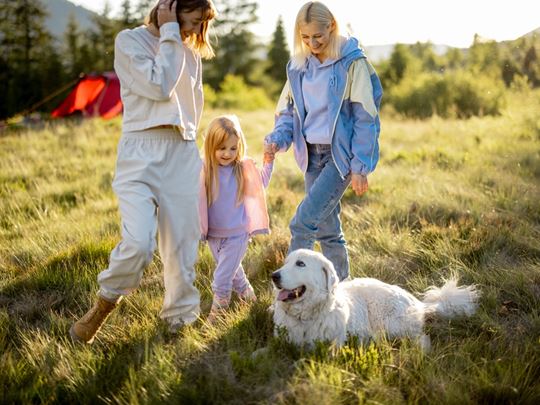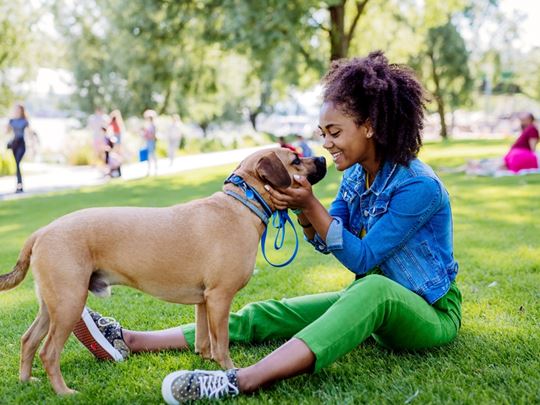
Over half of UK households have a pet, so we are often asked, ‘Can I foster if I have a pet?’ But what about dogs? With cautionary tales plastering the news, it’s no wonder people are confused.
We can confirm that having a dog won’t necessarily stop you from fostering. Not only are dogs adorable, but they are a comfort and a friend to the whole family, with countless benefits for children living in foster homes.
Are all dogs considered when you foster?
We consider most dogs, but like humans, their personalities, backgrounds and temperaments are unique, so your dog will be viewed as a family member during your assessment, being assessed alongside you.
We’ll ask questions about your dog before seeking further details about your dog’s health, care and behaviour from your vet. When we visit you at home, we’ll get to know your furry companion to ensure they are safe living with children.
Banned Dog Breeds
Our top priority is the well-being and safety of the children and young people you foster, so if your dog’s breed is on the banned list, they’ll need to be relinquished if you’d like to start or continue fostering.
Banned dog breeds include Pit Bull Terriers, Japanese Tosas, Dogo Argentinos, Fila Brasileiros and American XL Bullys.
If you have three or more dogs, due to their natural pack instinct, you’ll need to answer some additional questions, and sometimes we require an assessment from a dog behavioural specialist.

5 Benefits of Dogs on Foster Families
There is nothing like the warm welcome of your dog after a long day; they are always excited to see you and can’t wait to greet you with doe-eyes and a wagging tail. But what are the benefits of having dogs on children and adults in foster homes?
Dogs help children settle into their new home
Children in care can suffer from attachment difficulties if they’ve had many placement moves. The upheaval can prevent them from trusting adults and can make it difficult for them to settle into their new home.
Having a dog, however, can help children with this transition, providing comfort and helping them to form attachments with the whole family. Dogs offer unconditional love and a listening ear so children can talk to them with the assurance that their thoughts, fears and dreams are safe in the dog’s paws.
Dogs help foster families build connections
At Fostering People, we understand the importance of community and having networks of local support you can rely on.
Having a dog gives you more opportunities to connect with like-minded foster families. Dogs love nature and socialising, offering you an excuse to organise dog walking dates so you can bond with other dog lovers. Dogs can also be fantastic conversation starters for children in care, giving them something to discuss and helping them make friends, which will build their self-esteem and confidence.
Dogs can help children regulate their emotions
When children are angry, sad, anxious or scared, interacting with the family dog can help them regulate their emotions. Dogs can be soothing in emotionally charged situations, sharing their calm with children and helping them clear their minds and collect their thoughts.
Stroking, playing or cuddling a dog can lower cortisol, a stress hormone and increase oxytocin, a hormone that promotes feelings of happiness. Dogs also encourage children to get fresh air and exercise, which helps them release pent-up tension and feel more tranquil.
Therapy dogs can help children with trauma
Children in foster care often have trauma from challenging childhood experiences and may need therapy to recover. Animal-assisted therapy is an effective way of helping children work through their trauma.
During each session, children will interact with an animal whilst working through their thoughts, feelings and emotions with a therapist. If the therapy animal is a dog, children may walk, groom and play with them, assisting the therapist’s understanding of how they form relationships and attachments. The distraction of a pet can also make children feel more at ease when sharing their life experiences.
Dogs can support a healthy routine
When you have a dog, routine is vital for caring for their needs and ensuring you have time to take them for walks and stimulate their senses with play. Routine is also fundamental to children in care, especially if they have had their routine disrupted by moving homes. For children in foster homes, predictable routines can provide a sense of normality, alleviating anxiety because they know what to expect.
Dogs can help you build a healthy routine where children have some responsibility over walking, feeding and grooming the dog. Not only will this routine encourage them to exercise and help them learn about responsibility, but it will enhance their self-esteem because it shows that you trust them to take care of another family member.
Matching Foster Children and Dogs
Although children and dogs make fabulous companions, sometimes children may be afraid of dogs or have allergies that make living together unsuitable. But at Fostering People, our priority is to match children with the right foster family so everyone feels safe and comfortable with a platform for growth.
During the matching process, we always share information with the local authority about any pets you have and will never place a child in a home with pets they are scared of or allergic to.
Tips for introducing children to dogs
When you foster a child and have a dog, it is vital to consider how you will introduce them to each other. Here are our tips:
- Introduce your dog to your child in a calm environment with an exit available for your dog if they feel uncomfortable.
- You can encourage your child to offer treats to your dog, but don’t force interactions; they’ll bond in their own time.
- Ensure the supervision of your child when they are around your dog, monitoring their interactions for the safety of both parties.
- Discourage your child from disturbing your dog whilst they are eating or drinking.
- Don’t forget to photograph the special moment of their first meeting.
If you foster and don’t have a dog but are considering adding one to your family, you must talk to your supervising social worker first.
At Fostering People, we offer diverse placement types, including short-term, respite, emergency, long-term fostering and more. So, if you would like to take that first step to becoming a foster parent, get in touch with us via the form on this page or give us a call at 0800 098 4149.